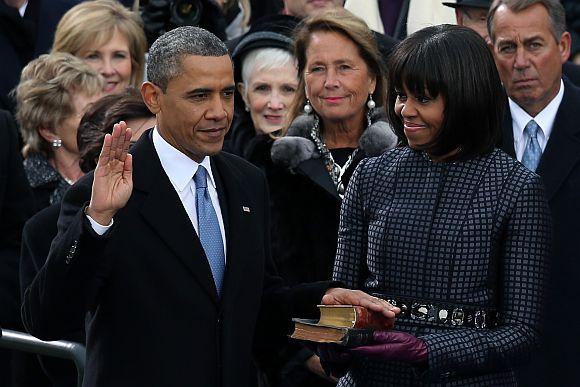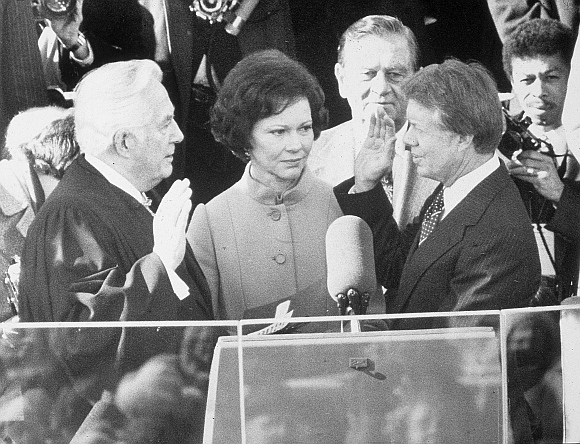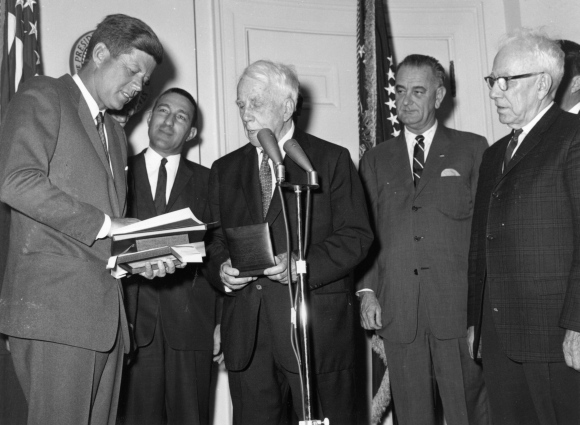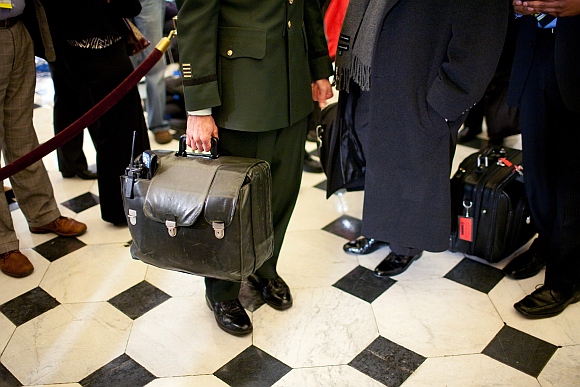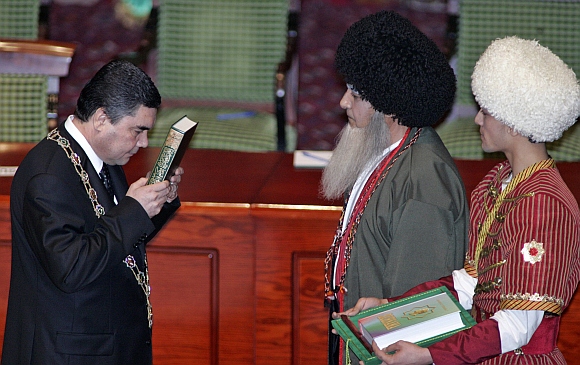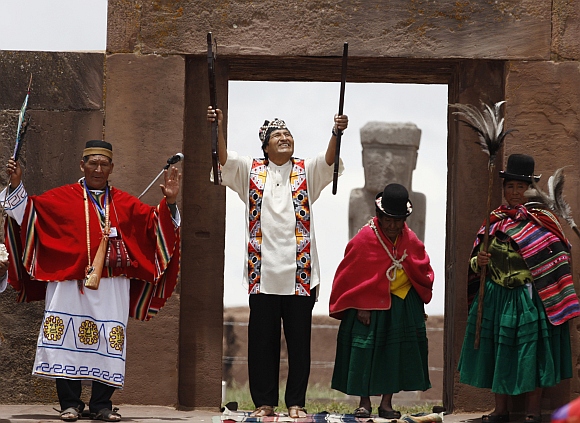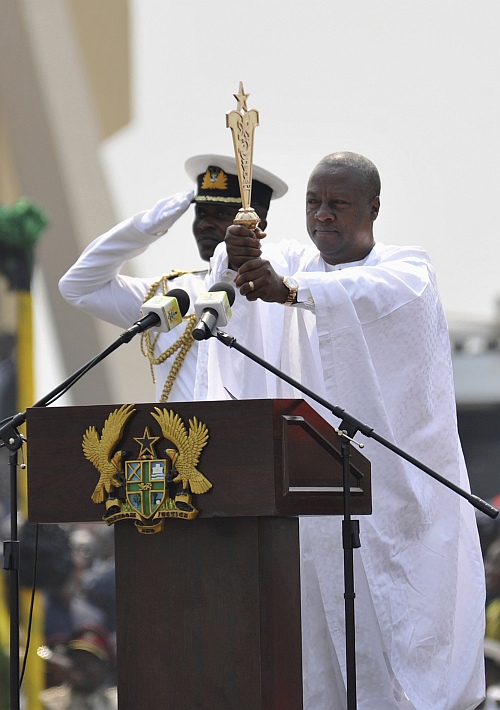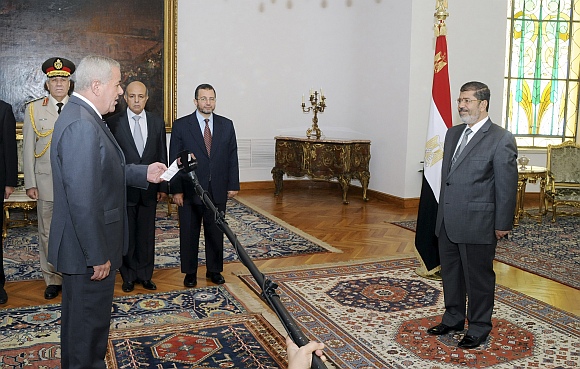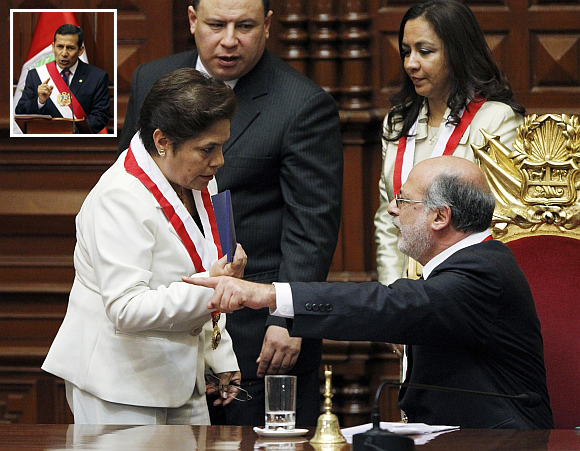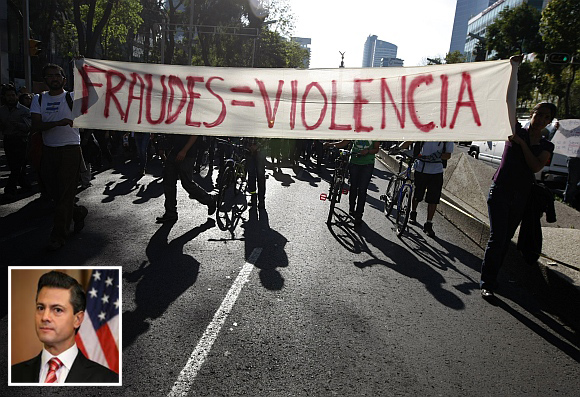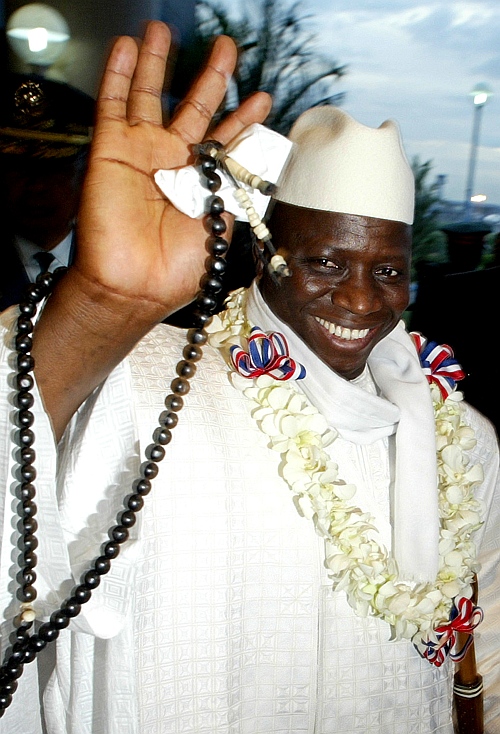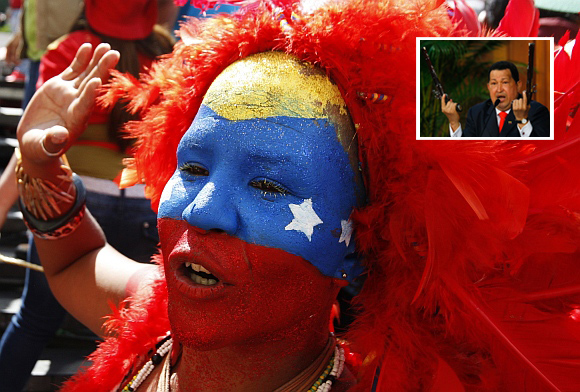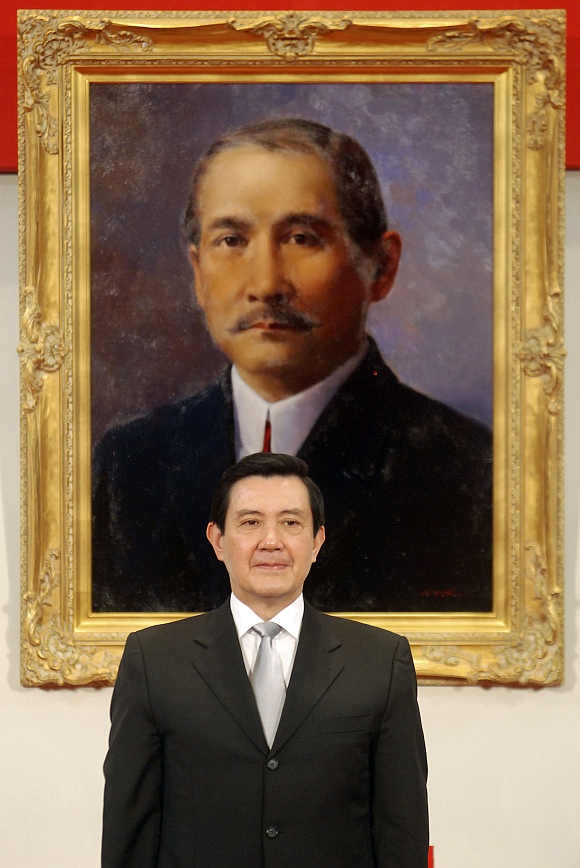 | « Back to article | Print this article |
Swearing-in traditions: Of nuclear briefcase and swords
United States President Barack Obama was sworn in on Monday in a grand inauguration ceremony at the National Mall in front of the Capitol. Attended by an estimate 6,00,000 people the festivities included black-tie balls, a parade, and musical performances.
Clearly, when in comes to swearing in new presidents, the US goes bigger than all other nations. In other nations, inaugurations may not be as lavish, but they have some intriguing traditions.
Foreign Policy takes a look at some of the most interesting oath-taking traditions from around the world.
Barack Obama renewed his oath of office on Monday and an estimated 6,00,00 people attended it. Though it was far fewer than the 18 lakh who were at Obama's first inauguration in 2009, the ceremony was pomp-filled.
In the US, the actual swearing-in occurs as close as possible to noon since that's when the last presidential term officially ends according to the 20th Amendment to the Constitution, reports Foreign Policy.
Click NEXT to read further...
Swearing-in traditions: Of nuclear briefcase and swords
The other American swearing-in customs have emerged over the years.
The now de rigueur presidential stroll down Pennsylvania Avenue dates back only to 1977, when Jimmy Carter did it as a populist gesture, reports Foreign Policy.
Click NEXT to read further...
Swearing-in traditions: Of nuclear briefcase and swords
John F Kennedy began the tradition of having an inaugural poet when he invited Robert Frost to read in 1961.
Frost brought a handwritten poem titled Dedication meant for the president. Although Frost had planned to read aloud a typed copy of the poem at the ceremonies, the sun glare reflecting off the heavy snow that fell the night before made it difficult to read.
Frost then recited by memory The Gift Outright, and handed the original handwritten version of Dedication to Kennedy and his wife Jacqueline, who framed the poem and wrote on the back: For Jack. First thing I had framed to be put in your office. First thing to be hung there.
Click NEXT to read further...
Swearing-in traditions: Of nuclear briefcase and swords
In the United States, the handover of Armageddon-unleashing power is subtle. During the swearing-in ceremony, the military aide carrying the so-called "nuclear football" -- who stays with the president at all times -- crosses the stage to stand by the new leader.
In addition to the nuclear codes, the 45-pound briefcase contains a secure, encrypted phone with direct connections to nuclear command centers at the Pentagon, Air Force Space Command in Colorado Springs and Site R, the Raven Rock Mountain Complex near Ridge Summit.
Click NEXT to read further...
Swearing-in traditions: Of nuclear briefcase and swords
And some ceremonies are simply elaborate.
The inauguration of the Mongolian president includes several days of celebrations, including wrestling matches.
In 2009, the inauguration of Tsakhiagiin Elbegdorj consisted of 12 different budget items such as the suit, reception, wrestling, military parade, and receiving the foreign representatives.
Leaders of 16 countries were invited including Russian, Germany, Japan, Korea, France and India.
The ceremony, which approximately cost was estimated around 248 million tugrug, was severely criticised. So presidential wrestlemania may be discontinued hencedorth, according to the Foreign Policy report.
Click NEXT to read further...
Swearing-in traditions: Of nuclear briefcase and swords
In Turkmenistan, the president is traditionally sworn in standing on a white felt mat -- a symbol of good luck.
He is then given bread and salt as a symbol of prosperity and well being and a quiver with arrows symbolising the people's unity, reports Foreign Policy.
Click NEXT to read further...
Swearing-in traditions: Of nuclear briefcase and swords
There are a few presidents whho like to add their own touch to the ceremonies.
In 2006, a day before his official swearing-in, Bolivian President Evo Morales held a traditional ceremony at a sacred pre-Incan site where barefoot and dressed as a sun priest, he received a baton, encrusted with gold, silver and bronze, that symbolised his Indian leadership, the report said.
Click NEXT to read further...
Swearing-in traditions: Of nuclear briefcase and swords
In Russia, the inauguration includes a ceremony in which the "nuclear briefcase," containing the codes to the country's arsenal, is handed over to the new president.
The portable communications device uses a secret code called Cheget to allow the country's commander-in-chief to launch instruction that could potentially trigger a nuclear attack against a foreign country.
Widely seen as a relic of the Cold War standoff between Moscow and Washington, the suitcase remains at the president's side at all times, including on his foreign visits.
Also, their cremonies are grand.
Last year, Vladimir Putin was sworn in at the lavish Grand Kremlin Hall in a ceremony reportedly cost $664,000 -- half of it spent on commemorative medals for the guests -- and was followed by a $400,000 banquet.
Click NEXT to read further...
Swearing-in traditions: Of nuclear briefcase and swords
This year, Ghana's President John Dramani Mahama emulated the American style by inviting celebrities to the ceremony. Some of Nigeria's biggest film stars attended the function.
Click NEXT to read further...
Swearing-in traditions: Of nuclear briefcase and swords
Inauguration rituals can often become proxy political battles, states Foreign Policy.
Egypt's President Mohamed Mursi initially demanded to be sworn in last year in front of parliament rather than -- according to tradition -- in front of the Hosni Mubarak-appointed Supreme Court, but eventually gave in.
Click NEXT to read further...
Swearing-in traditions: Of nuclear briefcase and swords
According to the Foreign Policy report, when Peruvian President Ollanta Humala took power in 2011, he pointedly swore allegiance to Peru's 1979 constitution rather than the country's current constitution, which had been put in place by his rival, former President Alberto Fujimori.
Swearing-in traditions: Of nuclear briefcase and swords
Inaugurations have not always been peaceful. During the swearing in of Mexico's Enrique Pena Nieto protests erupted.
Leftist lawmakers unfurled a black banner inside the parliament chamber reading "Mexico in mourning" -- referring to the thousands killed by drug violence during his predecessor's administration.
Click NEXT to read further...
Swearing-in traditions: Of nuclear briefcase and swords
Inaugural speeches are mostly about national pride and unity. But Gambia's eccentric strongman President Yahya Jammeh is a clear exception to the rule.
Jammeh in his address last year accused his citizens of laziness, vowed to "wipe out almost 82 percent of those in the work force," and warned that "I will be more dangerous in the next five years", reports Foreign Policy.
Click NEXT to read further...
Swearing-in traditions: Of nuclear briefcase and swords
And then there are some dramatic oath-taking ceremonies.
In 2012, Papua New Guinea's governor-general -- technically the representative of the Queen of England -- refused to swear in Prime Minister Peter O'Neill, who had taken power controversially during his predecessor's illness, and abruptly walked out of the ceremony to "study the documents." He returned to swear O'Neill in three hours later.
Click NEXT to read further...
Swearing-in traditions: Of nuclear briefcase and swords
One of the most interesting swearing in was that of Venezuelan President Hugo Chavez.
The inauguration celebrations were held on January 10 despite the fact that he was out of the country for cancer treatment in Havana and could not actually take the oath of office. Nonetheless, supporters, as well as diplomats and three foreign heads of state, dutifully gathered for the "inauguration" of Chavez's fourth term, Foreign Policy reports.
Click NEXT to read further...
Swearing-in traditions: Of nuclear briefcase and swords
Tributes to national heroes are common during inaugurations.
The president of Taiwan is sworn in while standing before a portrait of the country's founder, Sun Yat-sen, reports Foreign Policy.
Swearing-in traditions: Of nuclear briefcase and swords
In Tanzania, the president receives a symbolic spear and shield when he is sworn in.
TOP photo features of the week
Click on MORE to see another set of PHOTO features...
